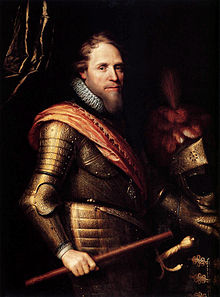Maurice of Nassau, Prince of Orange
| Maurice of Orange | |
|---|---|

Portrait by Michiel Jansz. van Mierevelt, 1607
|
|
| Prince of Orange | |
|
In office 20 February 1618 – 23 April 1625 |
|
| Preceded by | Philip William |
| Succeeded by | Frederick Henry |
| Stadtholder of Holland and Zeeland | |
|
In office 1 November 1585 – 23 April 1625 |
|
| Preceded by | William the Silent |
| Succeeded by | Frederick Henry |
| Stadtholder of Utrecht, Guelders and Overijssel | |
|
In office 1590 – 23 April 1625 |
|
| Preceded by | Adolf van Nieuwenaar |
| Succeeded by | Frederick Henry |
| Stadtholder of Groningen | |
|
In office 1620 – 23 April 1625 |
|
| Preceded by | William Louis |
| Succeeded by | Ernst Casimir |
| Personal details | |
| Born | 14 November 1567 Dillenburg, Nassau |
| Died | 23 April 1625 (aged 57) The Hague, Holland, Dutch Republic |
| Resting place | Nieuwe Kerk, Delft, Netherlands |
Maurice of Orange (14 November 1567 – 23 April 1625) was stadtholder of all the provinces of the Dutch Republic except for Friesland from 1585 at earliest until his death in 1625. Before he became Prince of Orange upon the death of his eldest half-brother Philip William in 1618, he was known as Maurice of Nassau.
Maurice spent his youth in Dillenburg in Nassau, and studied in Heidelberg and Leiden. He succeeded his father William the Silent as stadtholder of Holland and Zeeland in 1585, and became stadtholder of Utrecht, Guelders and Overijssel in 1590, and of Groningen in 1620. As Captain-General and Admiral of the Union, Maurice organised the Dutch rebellion against Spain into a coherent, successful revolt and won fame as a military strategist. Under his leadership and in cooperation with the Land's Advocate of Holland Johan van Oldenbarnevelt, the Dutch States Army achieved many victories and drove the Spaniards out of the north and east of the Republic. Maurice set out to revive and revise the classical doctrines of Vegetius and pioneered the new European forms of armament and drill. During the Twelve Years' Truce, a religious dispute broke out in the Republic, and a conflict erupted between Maurice and Van Oldenbarnevelt, which ended with the latter's decapitation. After the Truce, Maurice failed to achieve more military victories. He died without legitimate children in The Hague in 1625, and was succeeded by his younger half-brother Frederick Henry.
Maurice was a son of William the Silent and Princess Anna of Saxony and was born at the castle of Dillenburg. He was named after his maternal grandfather, the Elector Maurice of Saxony, who was also a noted general.
...
Wikipedia
